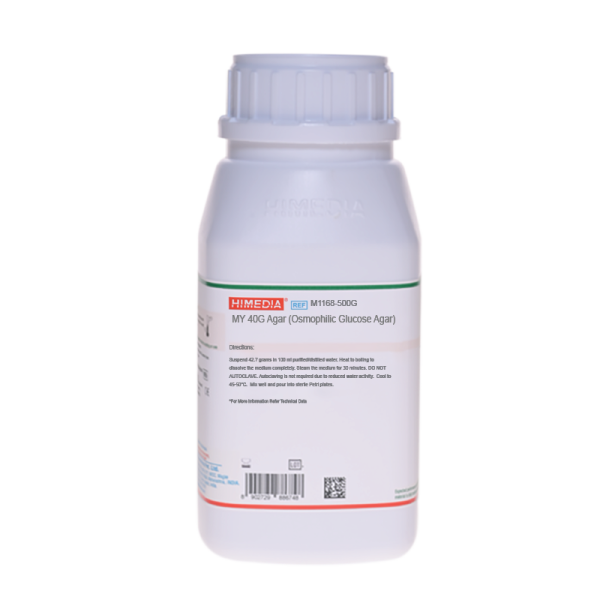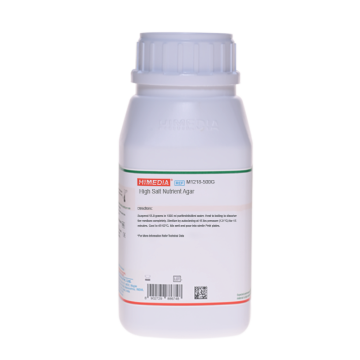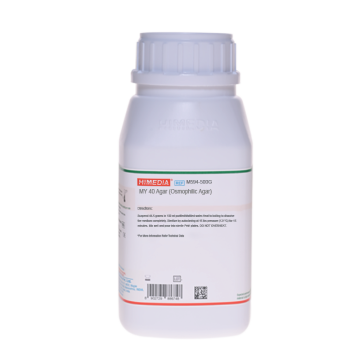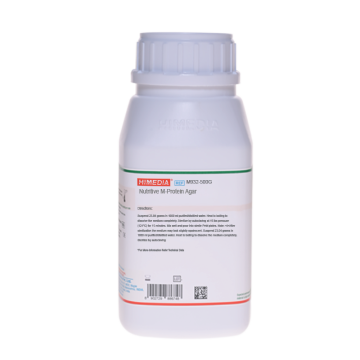 Your enquiry has been submitted
Your enquiry has been submitted
MY 40G Agar (Osmophilic Glucose Agar)
Osmophilic Microorganisms#CC293D
Intended Use
Recommended for isolation and cultivation of osmotolerant microorganisms from food.
Composition
| Ingredients | Gms / Litre |
|---|---|
| Dextrose (Glucose) | 400.000 |
| Malt extract | 12.000 |
| Yeast extract | 3.000 |
| Agar | 12.000 |
Final pH (at 25°C): 5.5±0.2
Formula adjusted, standardized to suit performance parameters
Directions
Suspend 42.7 grams in 100 ml purified/distilled water. Heat to boiling to dissolve the medium completely. Steam the medium for 30 minutes. DO NOT AUTOCLAVE. Autoclaving is not required due to reduced water activity. Cool to 45-50°C. Mix well and pour into sterile Petri plates.
Principle And Interpretation
Osmophilic yeasts usually are the cause of spoilage of high-sugar foods, including jams, honey, concentrated fruit juices, chocolate candy with soft centres etc. (4,6). Organisms that can grow in high concentrations of organic solute, particularly sugars, are called osmophiles. Yeast are the most common osmophilic microorganisms encountered in non-ionic environments of high osmolality, such as foods containing high concentrations of sugar. Osmophilic Glucose Agar formulated by Pivnick and Gabis (3) is prepared as per APHA (5) and is used for the detection and isolation of osmophilic microorganisms like yeasts, which are most commonly encountered in the food industry.
MY in MY-40G Agar stands for malt extract and yeast extract and 40 for the 40% of glucose in the medium, which meets the above requirements. The medium contains malt extract and yeast extract which supply the nitrogenous nutrients, amino acids, vitamins, trace ingredients to the osmophilic yeasts. 40% glucose in the medium satisfies the nutritional need of these yeasts.
Type of specimen
Food samples
Specimen Collection and Handling
For food samples, follow appropriate techniques for sample collection and processing as per guidelines (5).
After use, contaminated materials must be sterilized by autoclaving before discarding.
Warning and Precautions
Read the label before opening the container. Wear protective gloves/protective clothing/eye protection/face protection. Follow good microbiological lab practices while handling specimens and culture. Standard precautions as per established guidelines should be followed while handling specimens. Safety guidelines may be referred in individual safety data sheets.
Limitations
- Further biochemical and serological tests must be carried out for further identification.
- Some organism may show poor growth due to nutritional variation.
- Individual organisms differ in their growth requirement and may show variable growth patterns on the medium.
- Each lot of the medium has been tested for the organisms specified on the COA. It is recommended to users to validate the medium for any specific microorganism other than mentioned in the COA based on the user's unique requirement.
Performance and Evaluation
Performance of the medium is expected when used as per the direction on the label within the expiry period when stored at recommended temperature.
Quality Control
Appearance Off-white to yellow homogeneous free flowing powder
Gelling Firm, comparable with 1.2% Agar gel.
Colour and Clarity of prepared medium Medium amber coloured slightly opalescent gel forms in Petri plates
Reaction Reaction of 42.7% w/v aqueous solution at 25°C. pH: 5.5±0.2
pH 5.30-5.70
Cultural Response Cultural characteristics observed after an incubation at 25-30°C for upto one week.
| Organism | Growth |
|---|---|
| Saccharomyces rouxii ATCC 28253 | luxuriant |
Storage and Shelf Life
Store between 10-30°C in a tightly closed container and the prepared medium at 20-30°C. Use before expiry date on the label. On opening, product should be properly stored dry, after tightly capping the bottle in order to prevent lump formation due to the hygroscopic nature of the product. Improper storage of the product may lead to lump formation. Store in dry ventilated area protected from extremes of temperature and sources of ignition. Seal the container tightly after use. Product performance is best if used within stated expiry period.
Disposal
User must ensure safe disposal by autoclaving and/or incineration of used or unusable preparations of this product. Follow established laboratory procedures in disposing of infectious materials and material that comes into contact with sample must be decontaminated and disposed of in accordance with current laboratory techniques (1,2).
Reference
- Isenberg, H.D. Clinical Microbiology Procedures Handbook 2nd Edition.
- Jorgensen, J.H., Pfaller, M.A., Carroll, K.C., Funke, G., Landry, M.L., Richter, S.S and Warnock., D.W. (2015) Manual of Clinical Microbiology, 11th Edition. Vol. 1.
- Pivnick H. and Gabis D. A., 1984, In Compendium of Methods for the Microbiological Examination of Foods, 2nd Ed., American Public Health Association, Washington, D.C.
- Rose A. H. and Harrison J. S., (Eds.), 1970, The Yeasts, Vol. 3, Academic Press, New York.
- Salfinger Y., and Tortorello M.L. Fifth (Ed.), 2015, Compendium of Methods for the Microbiological Examination of Foods, 5th Ed., American Public Health Association, Washington, D.C.
- Tilbury R. H., 1980, "Biology and Activities of Yeasts", Skinner and others (Ed.), Academic Press, London.
| Product Name | MY 40G Agar (Osmophilic Glucose Agar) |
|---|---|
| SKU | M1168 |
| Product Type | Regular |
| Physical Form | Powder |
| Origin | Animal Free (Veg) |
| Packaging type | HDPE |
| References | 1. Rose A. H. and Harrison J. S., (Eds.), 1970, The Yeasts, Vol. 3, Academic Press, New York. |







